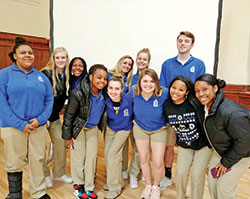A Promise to Keep marks 25 years of young Church leading the way

Peer mentors in A Promise to Keep Program from Bishop Chatard High School in Indianapolis pose for a photo during the programís annual luncheon on March 14 at the Archbishop Edward T. OíMeara Catholic Center in Indianapolis. (Submitted photo)
By Brandon A. Evans
Bob Tully was filled with gratitude as he looked out on the hundreds of high school students who had gathered for the annual A Promise to Keep (APTK) luncheon at the Archbishop Edward T. O’Meara Catholic Center in Indianapolis.
He was pleased that the program was marking its 25th year in the archdiocese, and he was thrilled that so many youths today are committed to the peer mentoring program that promotes the benefits of chastity and faithfulness in marriage.
“Thank you,” he said many times over in his address to the high school students on March 14, “on behalf of all old people like me.”
(Related: Watch a video of Tully's presentation)
Married for 54 years, the vice president for Mission and Ministry at Roncalli High School in Indianapolis shared his admiration for the young people who have spent the last year mentoring their peers to live a life of chastity called for by Jesus Christ and before him through the Ten Commandments.
“We’re at war with the devil,” Tully told them, noting during his talk the grim shadow cast by the clergy sex abuse crisis in the Church and the breakdown of family values in the West. “And sometimes I think he’s winning, and that bothers me.”
But then he thinks of the hundreds of thousands of young people who gather for Mass at World Youth Day, or the vibrant and singing teens who gather in the tens of thousands every two years for the National Catholic Youth Conference, or those teens before him.
“And I know there’s hope,” he said. “You are important, and what you do matters, so thank you for that.”
The Catholic Church is in good hands, he insisted, because of young people like those at the luncheon. It angers him when people refer to them as “the future of the Church.”
“No, you’re not,” he said firmly. “You’re the young Church of today.”
The hundreds gathered to hear him were only, for the archdiocese, the visible sign of a much larger program.
Margaret Hendricks, coordinator of adolescent growth programs for the archdiocese, said that more than 12,000 mentors have passed through the program since it began in 1994—and those teenagers have taken the message they learned to more than 120,000 Catholic school students through the years.
High school mentors share lessons based in character formation and skills development with students in sixth- through eighth grade, providing not only information but a crucial and vibrant witness of someone committed to dating with purity, Hendricks said.
The younger students see the mentors, “who are just a little older than they are witness about the virtue and values they find important in their life,” she said. “This is especially important in the area of friendships and dating.”
As for the mentors who have publicly and happily committed to such a lifestyle, they form a kind of community with each other that promotes accountability.
“Young adults do not want to be hypocritical,” Hendricks said, “so mentorship has a way of strengthening the decision to live chastely.”
The program was founded 25 years ago by Eve Jackson, whom Hendricks called a “visionary.”
“Recognizing the success attained through peer mentoring in the treatment of alcohol and drug addiction,” Hendricks said, “St. Vincent Health proposed a partnership with the Office of Catholic Schools to develop a peer mentoring program to promote the health and spiritual benefits of chastity and faithfulness in marriage.”
From that small starting point, Jackson went to the principal of Roncalli, then Joseph Hollowell, to see if the school would help pilot the program. From there, Bob Tully “embraced the vision and mission of this ‘grassroots’ program wholeheartedly,” Hendricks said.
The program started with 18 mentors. Within a few months, Hendricks said, five more Catholic high schools had joined the program. By the end of that first year, there were more than 350 peer mentors who were teaching young students.
Sylvia Brunette began as a volunteer that first year and continues to this day, now serving as the Indianapolis North Deanery coordinator.
From her dedication, and that of Jackson and Hendricks, who took over as program coordinator in 1998, the program has flourished.
“The very first mentors are now about 42 years old,” Hendricks said. “Many have students in our Catholic schools who are participating in the program. Over the past few years, some of these early mentors even have sons or daughters in high school who are now participating in APTK as peer mentors.”
Built on a solid foundation, the future is bright.
Hendricks looks on to the next 25 years, imbuing them with the same hope that Tully sees.
“I would pray that through the mentorship in the program that the decisions and choices these teens and young adults make in the future will lead to an increase in vocations and, in particular, an increase in sacramental marriage that lasts a lifetime,” she said.
Tully’s view of the future was more sharply focused on the young people listening to him, urging them to take what they’ve taught and live it out in college and beyond.
“You know what?” he asked them. “You’re not finished.
“You are called to pursue universal holiness, and you haven’t yet fulfilled that call until you live the rest of your life.”
(For more information about the A Promise to Keep program or to watch a video of Bob Tully’s keynote address, log on to www.archindy.org/promisetokeep.) †
